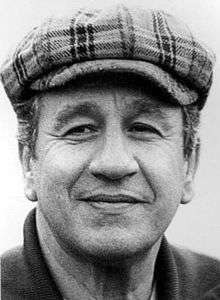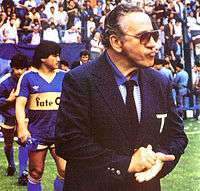Juan Carlos Lorenzo
 | |||
| Personal information | |||
|---|---|---|---|
| Full name | Juan Carlos Lorenzo | ||
| Date of birth | 10 October 1922 | ||
| Place of birth | Buenos Aires, Argentina | ||
| Date of death | 14 November 2001 (aged 79) | ||
| Playing position | Midfielder/Striker | ||
| Senior career* | |||
| Years | Team | Apps | (Gls) |
| 1940–1945 | Chacarita Juniors | 79 | (20) |
| 1945–1947 | Boca Juniors | 25 | (8) |
| 1947–1952 | Sampdoria | 77 | (19) |
| 1952–1953 | F.C. Nancy | ||
| 1954–1957 | Atlético Madrid | ||
| 1957–1958 | Rayo Vallecano | ||
| 1958 | RCD Mallorca | ||
| Teams managed | |||
| 1958–1960 | RCD Mallorca | ||
| 1961–1962 | San Lorenzo | ||
| 1962 | Argentina | ||
| 1962–1964 | Lazio | ||
| 1964–1965 | Roma | ||
| 1965 | San Lorenzo | ||
| 1966 | Argentina | ||
| 1966 | River Plate | ||
| 1967 | RCD Mallorca | ||
| 1968–1971 | Lazio | ||
| 1972 | San Lorenzo | ||
| 1973–1975 | Atlético Madrid | ||
| 1975–1976 | Unión de Santa Fe | ||
| 1976–1979 | Boca Juniors | ||
| 1980 | Racing Club | ||
| 1981 | Argentinos Juniors | ||
| 1981–1982 | San Lorenzo | ||
| 1982 | Atlante | ||
| 1982–1983 | Vélez Sársfield | ||
| 1983 | Atlanta | ||
| 1984 | Independiente Santa Fe | ||
| 1984-1985 | Lazio | ||
| 1985 | San Lorenzo | ||
| 1987 | Boca Juniors | ||
|
* Senior club appearances and goals counted for the domestic league only and correct as of July 2007. | |||
Juan Carlos ("Toto") Lorenzo (Spanish pronunciation: [ˈxwaŋ ˈkarlos loˈɾenso]; 22 October 1922 in Buenos Aires – 14 November 2001 in Buenos Aires) was an Argentine football player and coach. He is an icon for Boca Juniors fans, as he coached the club to its first two Copa Libertadores titles.
Biography
In his teens, Lorenzo played for Chacarita Juniors, and made his professional debut in 1940. He was transferred to Boca Juniors in 1945, and after two years he joined Italian side Sampdoria team, where he remained until 1952. His next clubs would be now-defunct French F.C. Nancy, and Atlético Madrid, Rayo Vallecano, and RCD Mallorca, where in 1958 he was coach and player. Then, he quit play but remained as coach.
Lorenzo would be the coach that helped Mallorca to promote to Primera División for the first time in 1960.[1][2]
Influenced by Argentine-Italian Helenio Herrera and riding the wave of his success in Spain, Lorenzo coached Argentina's San Lorenzo in 1961, and coached the Argentina national team in the 1962 FIFA World Cup. Back to Europe, he coached Lazio to Italian first division, and coached AS Roma in 1964. After coaching again the Argentine team for the 1966 FIFA World Cup, he would then return to Mallorca, then returned Lazio to first division, and won his first Argentine title (of a total of two) with San Lorenzo in 1972.[3]

In 1973 Lorenzo went to Atlético Madrid, who went on to win the league title and lose the 1974 UEFA Champions League final to Bayern Munich. Back in Argentina, he coached recently promoted Unión de Santa Fe in 1975.[4] The next year, he returned to Boca Juniors amid great pressure (rivals River Plate had just won back-to-back titles), and started one of the most successful periods in the history of the club. In his four-year tenure, Lorenzo and Boca took two local and three international titles, including the 1977 Intercontinental Cup (played in 1978).
Lorenzo's Boca was anchored by goalkeeper Hugo Gatti, a longtime Boca fan who fulfilled his dream of playing for Boca, and went on to become the player with most appearances in Argentine football history. In the defense, Vicente Pernía in the right and Alberto Tarantini in the left complemented centrals Francisco Sá and Roberto Mouzo. In the center field, reinforcements such as Jorge Ribolzi and Mario Zanabria played alongside veteran Boca players like Jorge Chino Benítez and Rubén Suñé. The attacking line was based on the speed of Ernesto Mastrángelo and Luis Darío Felman.[5]
After that cycle, Lorenzo coached a number of different clubs with less success, including Racing Club, Argentinos Juniors, San Lorenzo, Vélez Sársfield, Atlanta, and Lazio, to return to Boca Juniors in 1987. But his second stint with Boca was brief, and Lorenzo finally retired from coaching.[6]
Titles as manager
- Segunda División (1): 1959-60
- Primera División (2): 1976 Metropolitano, 1976 Nacional
- Copa Libertadores (2): 1977, 1978
- Intercontinental Cup (1): 1977
References
- ↑ "Entrenadores míticos: Juan Carlos 'Toto' Lorenzo" by Gonzalo Mazarrasa on Club Mallorca website
- ↑ "Muere Lorenzo, el primer entrenador que llevó al Mallorca a Primera División", El Mundo, 15 Nov 2001
- ↑ "Aquel templo del fútbol en Boedo", by Pedro Uzquiza, Clarín, 2 Dec 1999
- ↑ "La era del 'Toto'" on Tatengues website
- ↑ Lorenzo's Biography Informe Xeneize
- ↑ "Las mil y una del Toto Lorenzo", Clarín, 27 Oct 1996